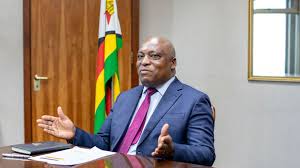Zimbabwe Central Bank Chief Says ZiG 43% Devaluation Is ‘Once-Off’ Event
“We expect things to stabilize going forward and should start to see prices fall.”

Zimbabwe sought to assure citizens that its gold-backed currency would not suffer another steep devaluation and steps were being taken to assure its defence.
“It was a once-off,” Reserve Bank of Zimbabwe Governor John Mushayavanhu told the state-owned Zimbabwe Broadcasting Corporation in an interview posted on X. “We expect things to stabilize going forward and should start to see prices fall.”
- Advertisement -
The ZiG — short for Zimbabwe Gold – was devalued by 43% on Sept. 27 to 24.4 per dollar after a wide gap emerged between the official and unofficial exchange rate. It is the southern African nation’s sixth attempt to stand up a local currency since 2009.
- Advertisement -
Since the devaluation, the ZiG has weakened by more than 7% on the official market and was quoted at 26.33 per dollar Friday, according to data posted on the central bank’s website.
But that is still well above the unofficial market rate of between 40 and 50 ZiG per dollar, according to ZimPriceCheck.com, a website that monitors official and unofficial exchange rates.
Previous efforts at having a stable local currency were sunk by hyperinflation caused by the government printing money to finance spending.
- Advertisement -
Mushayavanhu said the central bank would curb money supply growth by limiting credit creation by the nation’s lenders.
He said local currency deposits now stand at 10.7 billion ZiG ($406 million), without providing specific details on changes to the money supply since the ZiG was adopted in April, adding that gold and hard-currency reserves backing the unit have climbed to $450 million.
That compares with $285 million in early April.
“Money supply also increases through credit creation by banks and the recent move that we took to increase statutory reserves and up the bank policy rate will actually slow down credit creation,” Mushayavanhu said. “Money supply will remain under control.”
Source:norvanreports.com
- Advertisement -



